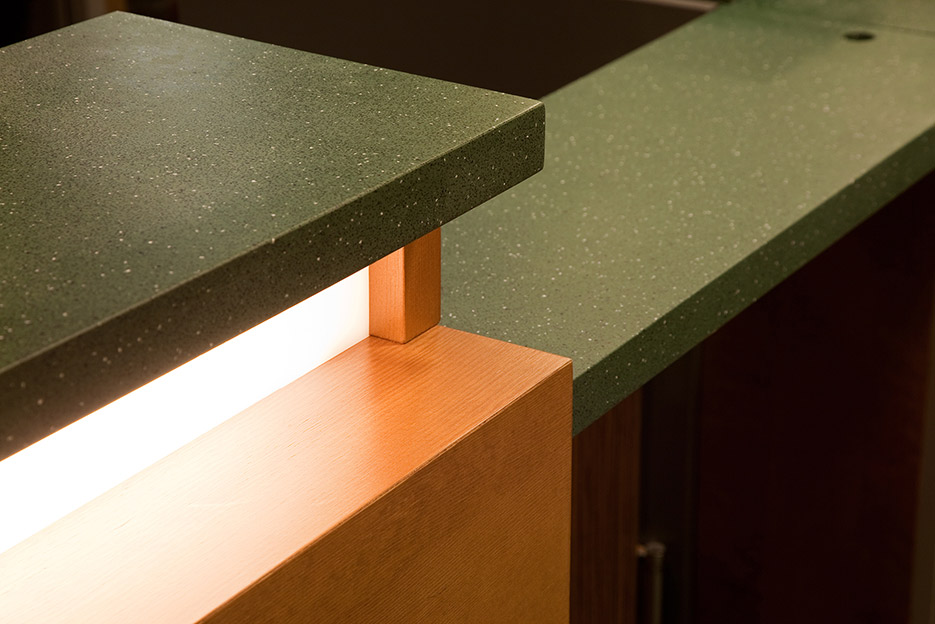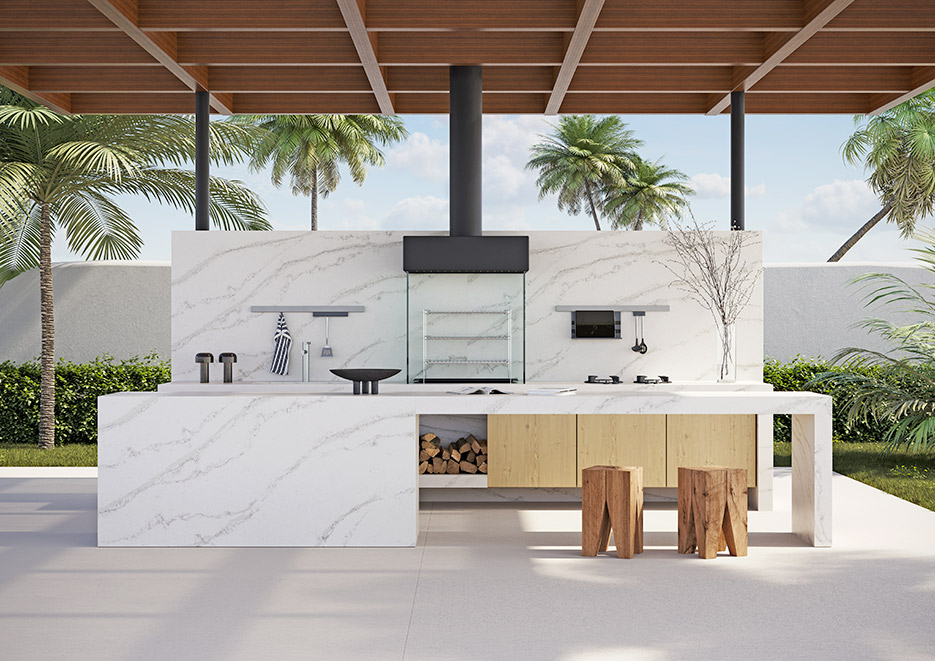CaraGreen Offers Sustainable, Eco-Friendly Countertop Choices
by Peter Marcucci
CaraGreen was launched in 2008, when developers were constructing a building in Chapel Hill, North Carolina, named Greenbridge. It was not only going to be the tallest building in town, but they were targeting LEED certification, a globally recognized symbol of sustainability achievement that comes in four levels: Certified, Silver, Gold and Platinum.
LEED levels are determined by the number of points acquired due to the amounts of recycled or recyclable materials used in its construction as well as lower carbon emissions, saving money by improving efficiency, and creating a healthier place for people. In the case of Greenbridge, they were pursuing Platinum certification, but did not quite achieve that level. They did receive certification, but not easily, recalled CaraGreen President Jessica McNaughton.
“The designer chosen to do all the finishes started looking around for sustainable materials to meet the Platinum criteria, but she could not find any. So she approached some family members saying, ‘I think there is a real opportunity here for a distribution model that brings sustainable materials to the Southeast market,’ and that’s how CaraGreen got started.”
A Portfolio of Sustainable Products
Initially, materials such as bamboo, recycled glass from the manufacturer Meld, cotton insulation called Ultra Touch, and Durat, a solid surface based out of Finland were the first products CaraGreen represented. At the time CaraGreen started, most recycled-content brands were sourced outside the U.S. Since then, the company has expanded to represent fifteen manufacturers of sustainable products, both recycled and recyclable, that are used on walls, floors, cladding, partitions, sound control and, of course, countertops. Most are produced in America, said McNaughton.
“We’ve worked really hard over the last seven years to bring more local brands to market. For example, Gilasi is recycled glass out of Chicago, Durat is recycled solid surface now produced in Georgia, PaperStone is recycled paper composite out of Washington State, and elementAI is recycled acrylic out of Buffalo, New York.”
From the beginning, CaraGreen’s goal has been to successfully commercialize sustainable material brands, be it their own or from other manufacturers, and supply all the necessary elements to do so, continued McNaughton. “If you have a small or medium-size brand, it’s really hard to break into the market and be successful, and we are a partner who helps you do that. It’s not simply distribution. We add marketing and data services and analytics and imagery to existing brands that are struggling to get a foothold, and then make them successful.”
Brands such as Durat and elementAI, which CaraGreen manufactures, are available worldwide, while most others are only available nationally to the trades through CaraGreen, though they have distribution partners in other areas, said McNaughton.
“Horizontal surfaces are our bread and butter, and we focus a lot in the commercial space. We also do residential, but our core competency is getting in front of the architects, telling the story of these products and the manufacturers, and getting them to buy into the idea of choosing better products, for better reasons. However, there are always trade-offs when using sustainable materials, and eventually there is a balance between the environmental story and the aesthetics. No one is going to choose the world’s ugliest countertops just because of the recycled content. So we work to balance those things in the architect’s mind. Our sales people do not do a hard sell. They’ll show you a portfolio of products, then you ask the questions, and then they’ll guide you to the right product. Maybe it’s a performance goal, a sustainability goal, a look, or concerns about silica.”
 |
|
Above: Durat – a solid surface material from CaraGreen – installed in a spa setting. Durat is now produced in Georgia from recycled materials. |
 |
Silica-Free for Safer Fabrication
In the last two years, Lapitec, a brand and material made by Breton SPA (yes, the machine manufacturer) created a new process that updated their old Lapitec, which had a small amount of silica due to its mineral content. The new Lapitec addresses both the high crystalline silica content (90 to 93%) in quartz slabs as well as the yellowing that can occur, explained McNaughton.
“Breton’s newest Lapitec has a proprietary mineral called “Biorite” that is 100% crystalline silica-free. The problem with crystalline silica is that it is kind of like ninja throwing stars, right? When you breathe it in, it cuts your lungs, and then your lung tissue scars over. There is no cure for it, and I believe that this problem is a tidal wave coming to this industry, and Lapitec is ahead of that.”
McNaughton summed up the company’s culture: “We started out with a philosophy about doing better for the environment, and a lot of the people whom we hire and the ethos of the company are really around human health and environmental health. So focusing on anything else diverts us from our lane, and if I’ve learned anything, it is ‘stay in your lane!’ People who try to do too much cannot be successful if they divert from what they are specializing in. We think that there are enough sustainable brands out there, and brands moving in that direction that we will always see sufficient amounts of products. We’ve had big brands come to us that would be huge bumps to our revenue, but they didn’t have the right story. And if they don’t have the right story, we are going to say no, because it is going to compromise our business model, and silica-free is one of our base criteria. We are focused on sustainability, because we always want to be forward-looking and at the forefront at what we are offering, and what’s happening in the industry today, and in the future.”
CaraGreen is a member of the U.S. Green Building Council, The American Institute of Architects, and the International Surface Fabricators Association.
For more information visit www.caragreen.com .